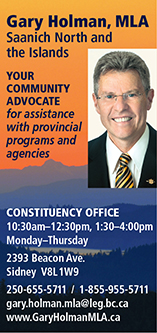Archive for September 2014
A new sound in Central Saanich
Flavourite Music now at the ol’ Marley Farm
by Michele Murphy, photo by Ed Johnson
Introducing Flavourite Music Retreat and B&B, situated on a 46- acre -farm and vineyard looking over the tranquil Mt Newton Valley.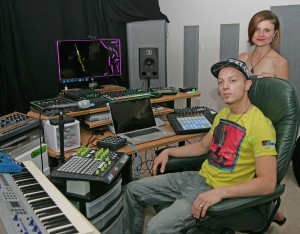
Saanichton-born and raised Lori J. Ward and her Austrian husband, Teo Orlando, are transforming the old Marley Farm into what they hope will be a world-class retreat for musicians, artists, foodies, farmers, gardeners, and travellers. Their energy, creativity and talent paired up with arguably the most awe-inspiring setting on the planet, just may be the perfect match.
A graduate of Parklands High School, Ward, 28, started in electronic music right out of high school. Studying under some of the best DJ’s of the day, she became the first female DJ on the West Coast. Within two years, she had played all over North America. Ward found opportunities in New York City, London, and Berlin, the birthplace of Flavourite Music, before she settled in Austria. Ward’s stage name became ‘Lori, the HIFI Princess’ and she was billed throughout the EU as Europe’s leading lady of techno. Today, she has recorded eight of her own albums and is considered by some to be one of the top female DJs.
It was in Austria that Ward met her husband Orlando, 31. Born in Italy, the hyperpolyglot (six languages) artist made his living as a popular DJ and producer working throughout Europe. His strong background in music production quickly made him an integral part of Flavourite Music. The music label offers production, recording, design, promotion and even
education, with Orlando running the Flavourite Music School (FMS). Since Flavourite Music’s start in 2007 it has over 250 tracks and 80 album releases to its credit.
The couple is excited about bringing their EU connections to Canada. Working with German pop and rock musicians, some of Europe’s best house DJs and hip-hop artists, Orlando feels confident that they will attract world-class artists to the farm. “It’s inspiring to be here. Working hard in the studio and then being able to sit back, looking over the hillside for a little downtime, it’s rejuvenating,” says Orlando.
""
“The music that we’re getting from our people here is phenomenal,” Ward explains of their client’s work. “The creativity just seems to flow so easily in this incredible setting.”
While music and farming seem to be a perfect fit, Ward confesses that the inspiration for farm life actually came from the financial reality of renting a studio in the Rock Bay district of downtown Victoria – as well as an office space and an apartment. She decided that all they needed was a mansion and a roommate to make this all work. When the farm with its 5,000 square- foot home came up for rent right across the street from her childhood home, Ward was sure that the universe was speaking directly to her.
Since they moved in just two months ago, already many of their plans for the farm have become realities. They have chickens and a vegetable garden bursting with produce. Their music school is booking up, their spacious guest rooms are listed on both AirBnB.com and B&B.com and their recording studio is in full- swing.
Ward is also excited about hosting events at the farm retreat. “The whole property lends itself so well to gathering and connecting with people. It’s the perfect setting for celebration,” she explains. The couple feel that with this spectacular location, the local harvest, the caliber of musicians that they can attract and their event management experience they will be able to offer unique top-quality music events, weddings, and fundraisers. Ward is researching local by-laws and looks forward to working with the community to make their events successful for everyone. She notes that Marley Farms hosted the sold-out FarmFolk CityFolk annual fundraiser, Feast of the Fields, in 2011.
When asked how it feels to be back in the Valley Ward answers, “When I returned to Victoria I thought my journey was over – now I am thinking that it’s just beginning. I have come full circle and I’m really excited about the future. I’m looking at the valley through totally new eyes.”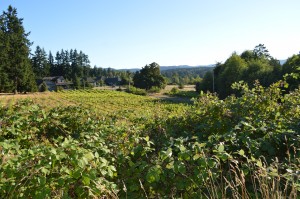
For more info on Flavourite Music go to www.flavouritemusic.ca
And the winner is…Voter Apathy?
by Roger Stonebanks
If history is any guide (and it often is), the winner in the Nov. 15 municipal and school board elections will be – apathy. The majority of voters will simply chose not to vote – and in significant numbers.
In the District of Saanich, the most populous municipality in the region, three-quarters of eligible voters are likely to give election day a pass. In the 2011 election, there were 84,546 eligible voters but only 21,134 turned up at the polls – 25 per cent. It was worse in 2008 – the turnout was 20.61 per cent. And worse again in 2005 – 19.13 per cent. In 2002 it was better – 24.6 per cent. The turnout does get better in the smaller Saanich Peninsula municipalities. In 2011 it was 32.93 per cent in Central Saanich, 41.2 per cent in North Saanich and 31 per cent in Sidney.
Why is there such disinterest – and what to do about it? Exhortations to “civic duty” clearly haven’t worked and neither has general hand-wringing about a sorry state of affairs. “If you discover the magic key, let me know,” said Saanich Coun. Judy Brownoff.
Saanich council decided this year to reinstate mobile voting stations for seniors’ facilities – and to continue mail-in ballots. As well, a new advanced polling station will be established at UVic.
“Over the years I ask people why they don’t vote,” said Coun. Brownoff. “The answer has been they are satisfied with Saanich council. Young families tell me they are too busy to get engaged. I’m not sure how to engage university age youth to vote at the municipal level. The level they are more concerned with are provincial and federal. They don’t seem to appreciate what can be accomplished at the local level.”
Coun. Brownoff thinks the importance of voting at the local level needs to be captured in the school curriculum by engaging youth at the middle school level; try to connect councils with university and college students; more advanced polling times, which Saanich is doing, and more information about what municipalities have the power to manage; and education on the Capital Regional District and roles of directors. Mobile voting units for seniors facilities and more advanced polling stations would help.
Saanich Mayor Frank Leonard said that in campaigning in neighbourhoods, “in a good year, you’d hope one-third vote, one-third might have voted but didn’t, and one-third wouldn’t vote no matter what convenience we provided. As for my own experience, I find that door-to-door canvassing identifies people who are likely to vote (so two-thirds at best) and campaigns work to get those that are sympathetic out on election day. So, by default it becomes apparent at the door who is not going to vote – the one-third – just not engaged in community, perhaps moving from home to home frequently, and don’t identify with any local issues or candidates.
“So as for those who seem interested enough to vote, sadly I think only half of them still vote – some of that their own lack of motivation and some of that issues of convenience. Motivation? The candidates and issues are key. So are the candidate campaigns, since we are low-budget compared to federal and provincial, the voters are not reached in the same way as we don’t have the media or volunteers to get out the vote.
“Convenience? That’s what our staff keep trying to overcome – mail-in ballots, more advance polls, mobile polls, where polls are, on and on.” 
Saanich Coun. Dean Murdock says that, “On the doorstep I hear a lot of families talk about the cost of housing, frustration
over traffic, or lack of proper sidewalks. These are all things that your council can work to change or influence. Paying attention to who is on the ballot and casting a vote for candidates that will fight for your concerns is how we effect change.”
He supports “all possible steps to improve access to voting” and specifically mobile advance polls and a polling station at UVic. Voter information cards are a good way to raise awareness about where and when to vote. “There is always more that can be done and I am keen to hear ideas that would get more people to the polls.” He added that Saanich staff have been asked to look into putting voting stations at places like shopping centres and recreation centres.
For info on where, when, and how to vote:
http://www.saanich.ca/living/election/index2.html
Tsartlip Nation Gas Station & Store Opens
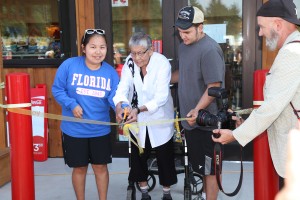
photos by Ed Johnson
An excited crowd of elders, chiefs, politicians, and families turned up for the ceremony and ribbon-cutting of the new Tsartlip Nation Gas Station and Convenience Store on Stelly’s Cross Rd. on Aug 21. The traditional ceremony offered a blessing for the new building and staff followed by a salmon barbeque.
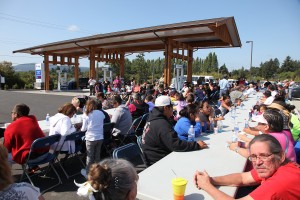
Wayne’s One Acre
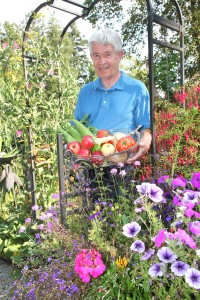 In this time of ‘food security’ awareness on the peninsula, there are few people that can justly claim that they are mostly self-sufficient with the food they can grow on their own property. While Saanich Voice Online has profiled Bill Morgan and Anne Freidank who manage to do so on a normal sized city lot, there are others who are fortunate enough to have a little more room to carry the project even further.
In this time of ‘food security’ awareness on the peninsula, there are few people that can justly claim that they are mostly self-sufficient with the food they can grow on their own property. While Saanich Voice Online has profiled Bill Morgan and Anne Freidank who manage to do so on a normal sized city lot, there are others who are fortunate enough to have a little more room to carry the project even further.
Wayne and Lynne Brander combine a prolific vegetable garden and fruit orchard on little more than one acre in Saanich where they have lived for the past thirty eight years. In an english garden style setting among flowers gracing the house, one could be completely unaware of the abundance grown around back.
Nestled among the many apple and fig trees are not only a bee hive from which they extract many pounds of honey, but a moveable chicken coop with four chickens which gives them a supply of eggs year around. “We eat, process and store everything we can on this property. The only things we require from the grocery store are dairy products. We get our meat from Ireland’s farm, about a kilometer away.”
Always trying new techniques, Wayne ‘rediscovered’ trench composting, which is nothing more than burying kitchen scraps six inches or more in the soil. “No pests to bother it, and no need to turn it over”, he explains. “You can plant some crops over it in the first year, even. If you have the room, it works better than any plastic composter and the soil is the immediate benefactor.”
When they moved to the property back in the 70’s, they planted a standard spartan apple tree which grew to more than fifteen feet in height. With the help of BC Fruit Testers (BCFTA.ca), Wayne learned the art of grafting onto dwarf rootstock, so that the new apple trees he planted would only grow to six or eight feet and still produce the same amount of full sized apples. “Not only did it save space,” he says, “but picking and pruning does not require a ladder either.” Besides his ‘designer’ apple trees, Wayne also has dwarf cherry, plum and pear trees and all types of berries and raspberries, “basically everything that can grow in our climate”.
And that includes tomatoes, peppers, squash, corn, kale — the list goes on. No chemical fertilizers are used, only chicken and horse manure.
Figs are a special fruit for Victoria gardens. They love this climate and, “you won’t find them in the stores because the shelf life is a matter of 48 hours. They must be picked when fully ripe and either consumed or dried, but growing them is quite easy,” Wayne says.
“This is basically about getting people to grow their own stuff. We are moving into an interesting period where our leaders are starting to throw trade sanctions around food. Just this week (mid August), we have Russia, with a population of 150 million saying they are not going to buy certain Canadian agricultural products. The bottom line with these sanctions will either be shortages or rapid increases in prices,” he advises.
The bottom line for would-be gardeners is that what Wayne and Lynne are doing on their property can be scaled down to a city lot or even a small backyard. Most municipalities now allow chickens too. A search of composting methods will yield techniques to give good soil from leaves, vegetable kitchen scraps, coffee grounds, egg shells, etc. – probably things the average person has been discarding as ‘waste’ or polluting the air with smoke.

